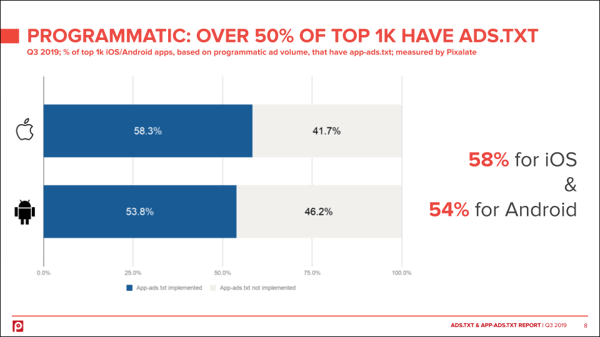
This week's review of ad fraud and quality in the digital advertising space.

In Pixalate's Q3 2019 App-ads.txt & Ads.txt Report, we reveal the growth rate of app-ads.txt among the most popular apps in advertising.
Of the top 1,000 most popular apps based on Q3 2019 programmatic ad volume:

eMarketer has compiled key article on digital video advertising from 2019 to catch you up to speed on the latest trends in the space. "Ad spending in digital video is [growing], and we anticipate it to grow 20.8% to more than $36 billion this year in the US," wrote eMarketer. "It’s happening in OTT and connected TV, as well as across mobile devices, programmatic exchanges and social media platforms."

"Google has announced a clamp down on the categories it will allow political ads to be targeted against, with only age, gender, and postal code to be used," reported ZDNet. "The changes are set to be introduced within a week in the United Kingdom due to its upcoming general election, followed by the European Union before the end of the year, and rest of the planet from January 6."

"[A] new study of some of the world's biggest marketers by the World Federation of Advertisers (WFA) indicates that more than twice as many aspire to bring their programmatic media buys in-house than plan to outsource it," reported MediaPost. "[Surveyed global marketers were] asked what their aspirations were for handling programmatic media buys in the future, [and] 50% said they see no change, while 36% plan more in-housing and 14% plan more outsourcing," wrote MediaPost.

"Beginning in February, Google will no longer include contextual content categories – content identifiers such as 'sports,' 'news' or 'weather' – in bid requests to ad buyers," reported AdExchanger. "Google cited privacy concerns as the reason for the change, since contextual categories exposed in a bid request can be appended to individual profiles, even if the data on its own doesn’t represent a user-level privacy threat."
*By entering your email address and clicking Subscribe, you are agreeing to our Terms of Use and Privacy Policy.
These Stories on Weekly Recaps
*By entering your email address and clicking Subscribe, you are agreeing to our Terms of Use and Privacy Policy.

Disclaimer: The content of this page reflects Pixalate’s opinions with respect to the factors that Pixalate believes can be useful to the digital media industry. Any proprietary data shared is grounded in Pixalate’s proprietary technology and analytics, which Pixalate is continuously evaluating and updating. Any references to outside sources should not be construed as endorsements. Pixalate’s opinions are just that - opinion, not facts or guarantees.
Per the MRC, “'Fraud' is not intended to represent fraud as defined in various laws, statutes and ordinances or as conventionally used in U.S. Court or other legal proceedings, but rather a custom definition strictly for advertising measurement purposes. Also per the MRC, “‘Invalid Traffic’ is defined generally as traffic that does not meet certain ad serving quality or completeness criteria, or otherwise does not represent legitimate ad traffic that should be included in measurement counts. Among the reasons why ad traffic may be deemed invalid is it is a result of non-human traffic (spiders, bots, etc.), or activity designed to produce fraudulent traffic.”

